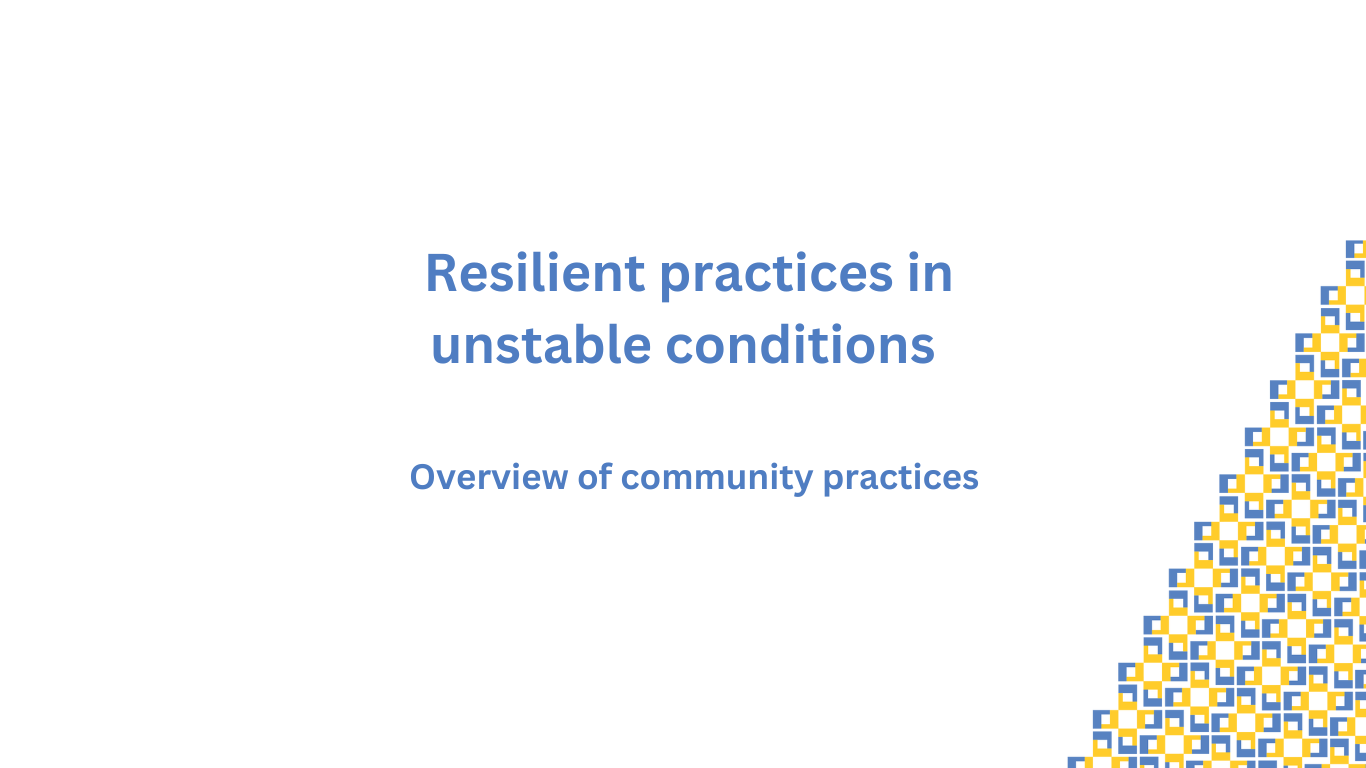Resilient practices in unstable conditions

Introduction
Today, the whole country is under attack: both in the front lines and in rear areas. The war has demonstrated that only the synergy of available resources of the state and society can produce a systemic positive result. At the same time, the effectiveness of managing the rear capabilities of social interaction is still debatable.
On the one hand, the enthusiasm of volunteers, communities, entrepreneurs and local self-government bodies faces a lack of resources and emotional burnout. On the other hand, differences in perception and interpretations of war duration projections may negatively affect the expectations of millions of Ukrainians. A comprehensive national resilience system is only beginning to be developed by state actors. This state of affairs, exacerbated by the lack of proper communication on the part of state actors, weakens the level of societal resistance in the country.
Presumably, a significant factor that can strengthen the integrity of the rear and the front is a broad social consensus around the concept of resilience. Domestic and international developments in this area, as well as the experience of the communities discussed below, testify to the particular value for Ukraine of the concept approach of resilience as a tool to prepare the state and society for the threats and crisis situations of any duration. Considering that in one form or another war can last for a long time, the entire organism of society needs to be rebuilt for the long haul without losing its functionality.
This means that, just like the Armed Forces of Ukraine, the rear must be ready for long-term crisis situations. At a minimum, families, societies, communities, entrepreneurs, businesses, authorities – everybody should have safety protocols that have algorithms for behavior before, during, and after a threat or crisis situation of any nature or duration. Such rules of behavior provide for awareness not only of state actors, but also of society about the whole spectrum of possible risks, inter-sector communication, accumulation of resources, and preparation for continuous functioning.
These and other necessary components of survival and recovery during any threats and crisis situations are the subject of regulation of national and international resilience systems.
Since the Ukrainian resilience formula, as defined by the National Platform for Resilience and Cohesion (hereafter, the National Platform or NP), is based on values, traditions (practices), and human potential, we investigated community experiences and resilient practices that are implemented at the grassroots level.
Resilient community practices studied since 2022 (namely immediately after Russia’s full-scale invasion on February 24, 2022) have provided a lot of material for analyzing Ukraine’s unique resilience formula, further systematizing the findings and shaping real resilience policies based on them.
However, we still mostly understand the Ukrainian phenomenon of modern resilience intuitively. Ukrainian resilience formula is based on resistance, adaptability and self-recovery, in this process the fundamental role is played by public institutions, social, civic resilience of social groups. Reflections and accompanying government documents fell behind with the integration of practical cases, and the cases themselves, without the proper analysis, cannot scale and be used by stakeholders.
In the presented review of community practices, we selected the experience of mobilization, work, and interaction of communities from all over Ukraine. This experience allowed the experts of the National Platform to define what the resilience of a community, business, city, social project or industry association means.
The next step is to make resilient practices more visible to stakeholders:
a) Experts and state actors of different levels, who are encouraged to participate in the development and implementation of state policies to ensure the national resilience system;
b) Donors and international organizations that seek to study the phe- nomenon of Ukrainian resilience and support best practices;
c) Other communities that may include potential partners, which will contribute to cooperation and expansion of the network.
The selected and generalized experience of the communities also gave impetus to the development of the National Platform. According to the results of the survey of participants of the National Platform’s community network, they are interested in participation in open events (public marathons, regional and national platforms, as well as presentations of expert developments); training courses, lectures, training sessions involving experts of the National Platform and international speakers; participation in the development of policies to convey ideas to stakeholders, as well as presence on media platforms.
Communities see the National Platform and the network of communities as active participants in the processes of developing and implementing the state policy of ensuring the national resilience system, initiators and actors for the development of common principles and mechanisms of resilient practices.
The National Platform together with the network of communities as part of the intersectoral interaction are ready to provide expert and methodological support for the national resilience system and to help prepare the relevant talent pool.
You can get acquainted with the text by following the link.
